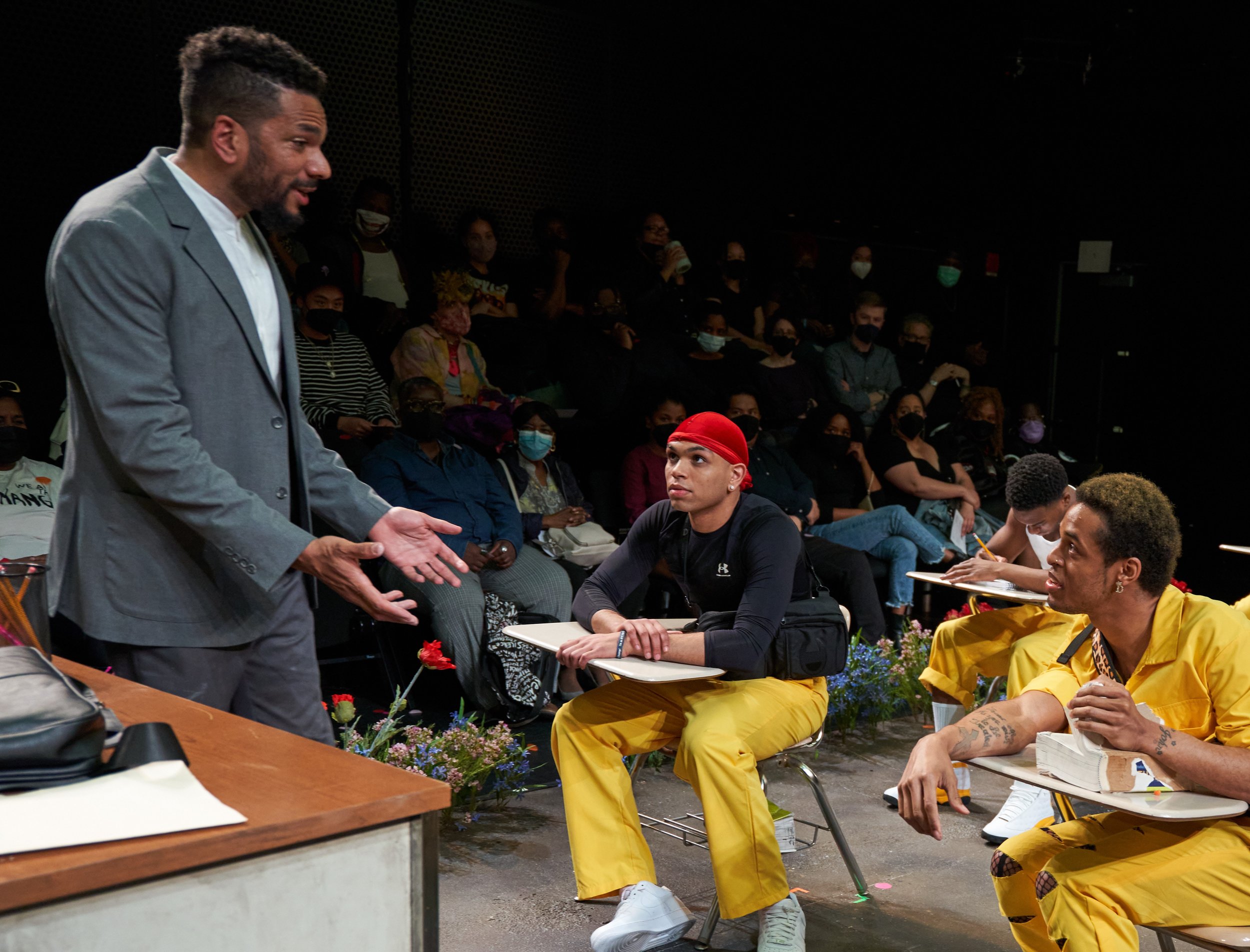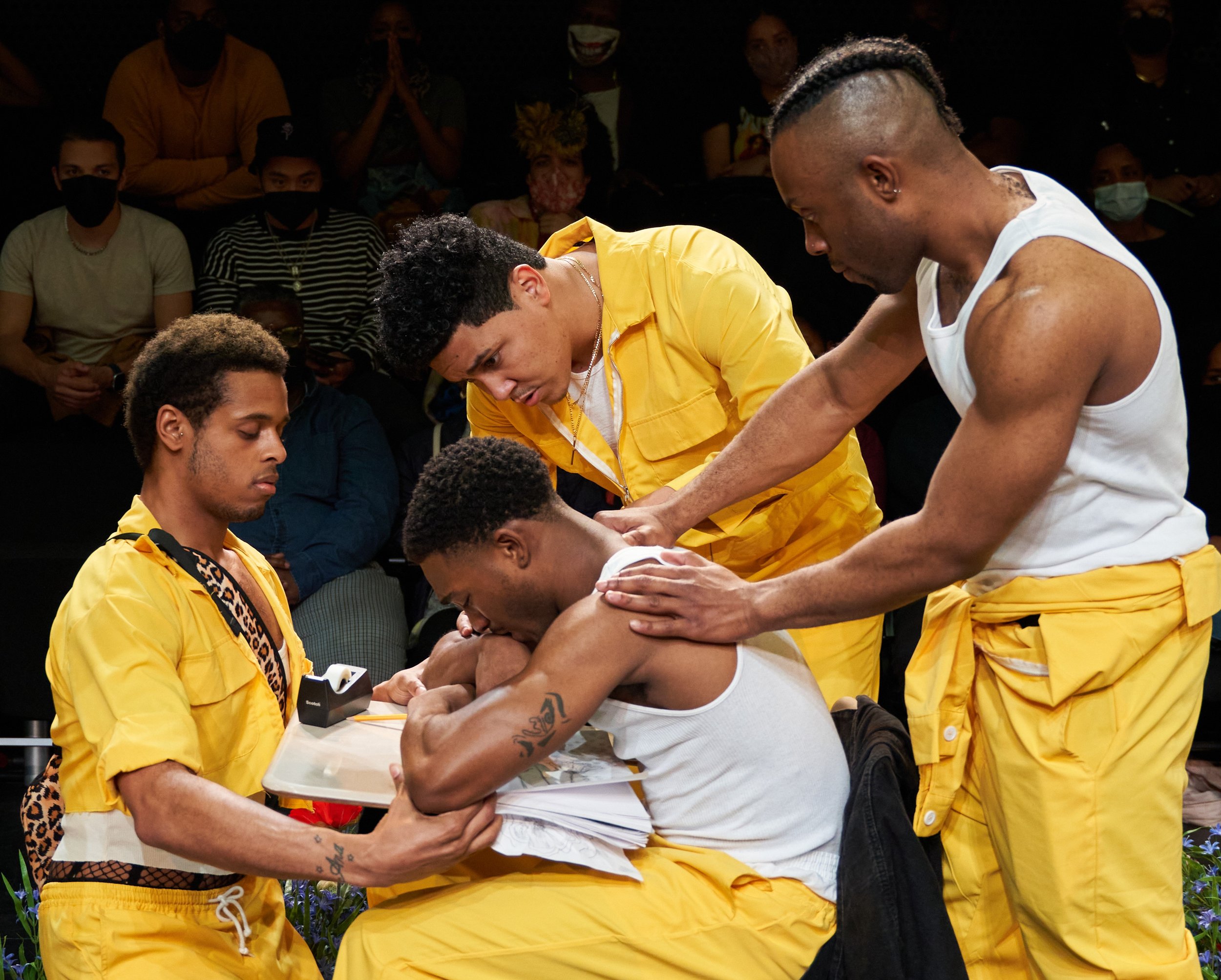Teacher Isaiah Corbin (Biko Eisen-Martin, left) talks to Jamal (Dario Vazques, center) and Dee (Essence Louts) as Antoine (Dharon Jones) draws in the background.
At its core, Donja R. Love’s powerful drama Soft has a certain familiarity. It is a variation on The Blackboard Jungle or Up the Down Staircase—but with a more ruthless, 21st-century demeanor. Its teenage characters have moved beyond the troubled inner city to incarceration, and their mentor has a darker past than either Glenn Ford or Sandy Dennis’s characters, respectively, in those films. In this facility, students wear prison jump suits and are part of a correctional program designed to save them from a criminal career—or is it?
Love’s drama, effectively staged in traverse by Whitney White on a cramped stage with flower pots around the perimeter (the set is by Adam Rigg), focuses on six rowdy minority inmates who have earned places in a reformatory-style boarding school. They are being taught English literature by Isaiah Corbin (Biko Eisen-Martin), an idealistic professor who, years earlier, was in their position after he and his brother were caught stealing to help feed their family. As Isaiah hands back essays that the young inmates have written on Othello, the students are introduced—a cross-section of deeply damaged youth.
Isaiah sees Bashir (Travis Raeburn) struggling to read. Photographs by Daniel J Vasquez.
The smartest is Kevin (Shakur Tolliver), who has been paired with Travis Raeburn’s troublemaking Bashir to write the essay. However, Bashir’s essay on Othello is so inadequate that Isaiah whispers that he will take over tutoring the young man. (One of the flaws in Love’s play is that Raeburn’s simmering Bashir is barely able to read, and the idea that he could be in a class where students study Shakespearean verse is preposterous.) Also near the lowest rung is Ed Ventura’s somnolent Eddie, who smokes dope and sleeps a lot.
But Jamal (Dario Vasquez), another student, is only half a point behind Kevin in the grading, and their rivalry leads to trash talk and ends in a sonnet rap competition that Isaiah fosters. Rounding out the students are the quiet Antoine (a charismatic Dharon Jones, who uses silence effectively), who likes to draw, and Dee (Essence Lotus), a flamboyant queer student—but not soft.
Indeed, the central question of Love’s play is whether any black man can survive if he shows softness. Isaiah is taken to task for being too sensitive by the hardened supervisor, Mr. Cartwright (a superbly burnt-out Leon Addison Brown), who warns Isaiah:
You need to start putting a choke hold on them—because if you don’t, they will put one on you so fast you’ll wonder when you stopped breathing, and after you figure that out, you’ll find yourself out of a job.
Isaiah’s methods of keeping things cool don’t always work, particularly after a student’s suicide, and the classroom scenes often end in conflict. Yet if the contours of Soft are familiar, it comes at a time when a flood of new plays about the Black experience in New York have provided audiences an extraordinary look at the concerns of the Black population. And perhaps more striking is the way that the plays sometimes speak to one another.
From left, Dee, Eddie (Ed Ventura) and Bashir surround a disconsolate Antoine.
Soft echoes in its title a concern expressed in James Ijames’s Fat Ham, which won the 2022 Pulitzer Prize for Drama. In an interview with PBS, Ijames says of his Black gay hero Juicy that he is “alive in his softness, very alive in his queerness, in this place that is not welcoming to that.”
Love’s characters carry around what the character Tio in Fat Ham calls “your whole family’s trauma, man…. But you don’t got to let it define you.” But Fat Ham registers as a comedy; for the characters in Soft, tragedy is inescapable. At one point Isaiah tries to help Eddie after he has fallen on the floor, but the student goes berserk: “Don’t touch me! Don’t fuckin’ touch me, you! I don’t need ya help!” Love doesn’t need to spell it out: these teens carry simmering trauma from violent stepfathers, drug-addicted mothers and probably sexual assault.
There are a couple scenes of dreams in Soft, in which flower petals flutter down. In one, the students solicitously crowd around an anguished Antoine, and even the abrasive Bashir puts a hand on Antoine’s head. It’s a startling scene, a vision of what these teens could be if they were allowed to be soft.
The last scene has a similar leap from reality: it’s a vision of Eden, where two of Love’s characters meet in the afterlife, and it echoes the ending of Antoinette Chinonye Nwandu’s Pass Over, seen on Broadway early last season with its own final vision of paradise. That it seems a reality to both playwrights that Black people will only find peace beyond the grave and never be able to be “soft” in this life reveals a depth of pain that can’t be measured.
Donja R. Love’s Soft plays through June 26 at MCC Theater (511 W. 52nd St.). Evening performances are at 7:30 p.m. Tuesday through Saturday; matinees are at 2:30 p.m. Saturday and Sunday. For tickets and information, visit mcctheater.org.





